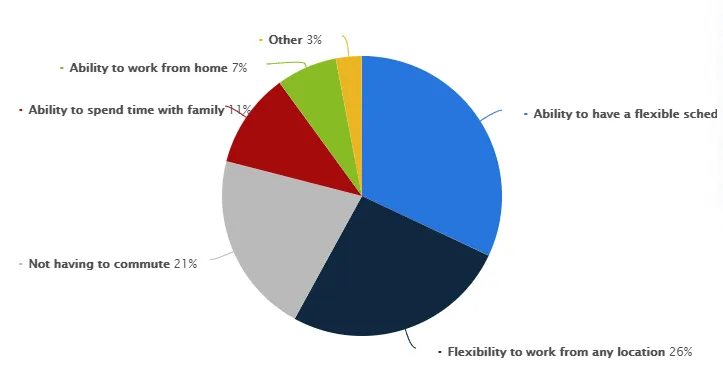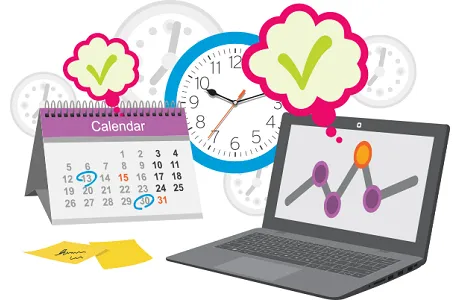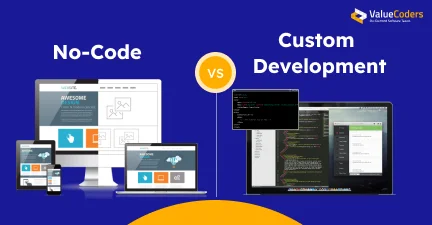COVID-19 pandemic has shaken the whole globe. During this pandemic, most of the enterprises(small to big) adopted remote working for employees and clients’ safety.
In the initial days when the lockdown was announced, many companies have faced various sorts of issues while managing to work from home (WFH). Even still few of the organizations are facing the same problems at the stretch of remote team management.
Challenges to Manage a Remote Team
A remote team is a group of experts from different time zones, distinct skills, and different cultures working unitedly on a unified project.
Currently, all small, moderate, big enterprises are focusing on adopting remote working as this is beneficial for current and upcoming time.
- As per the survey, it has been found that 82% of respondents said that they experience less stress.
- As per the Harvard Business Review, 87% of respondents feel more connected via remote working.
When the team works from the office, then it requires less management effort as a comparison to remote working. While managing the remote team, many challenges come across, and some of the remote team management challenges are related to:
- Lacking the Top Communication Tool
- Hiring the Correct Resources
- Lacking Accountability Program
- Noticing Everyone’s Time
- Unclear Roles and Tasks
- Lack of Schedule
- Unmanageable Employee Tracking
- Lack of Conversation within the Team
What Is The Biggest Advantage of Remote Working?
Statista stated that in 2020, 32% of respondents said that flexibility is one of the most significant benefits of remote working.
Flexibility not only helps employees, but it also benefits the organizations now you might be thinking how?
Well, when the employees are given work flexibility, then they try to complete and deliver the task on time, and this finally increases business productivity.
Statista stated that in 2020, 83% of the respondents are full-time remote workers, while 6% of them are small enterprise owners.
Good Read: Best Software Companies to Hire Dedicated Remote Teams In India
7 Significant and Efficient Ways To Manage Remote Team
If at some point, working virtually is useful then similarly, it also has few drawbacks like it requires perfect remote team management.
When the employee of the company will be productive, then only you will be able to boost the business growth, but for that, it is indispensable to manage the remote working properly.
You should do a proper module to manage the remote team and work. I have mentioned a few ways that will help you to manage the remote team.
- Make Use Of Modern Technologies
- Proper Checkment On Punch In and Punch-Out
- Don’t Let Communication Gap Hamper your Productivity
- Make Sure that Your Team Is Satisfied
- Focus On Final Result Not on Activity
- Arrange Proper Resources
- Offer Flexibility
Proper Record On Punch In and Punch-Out
Whenever you are managing the remote team, then suggest them to make proper punch in and punch out. If you are a team leader, then you should daily check the employees punch in and punch out.
The thing that does not end here means if in case the employee forgets to make a punch in and punch out then as a leader you should once ask the employee why he/she doesn’t mark the check-in or check out.
If the new member has joined the team, then the management team should accurately provide them guidance related to check-in and check out.
To manage this process in a proper manner you can also forward a gentle reminder associated with the same task, and for doing this, you can build a group on Skype, Zoom, Google Chat.
Make Use Of Modern Technologies for remote team management
To manage the remote team in a good manner, you should keep your team connected, and for this, you can use various communication tools like Slack or Microsoft Teams to make everyone engaged.
On using modern technologies, your team will also be able to explore and learn new technological features. There are numerous tasks like tracking, communicating that can be done quickly while making use of advanced technologies.
During the Coronavirus pandemic, several companies preferred the custom software for managing and tracking their employee’s work. This mainly helped team leaders and management as it saved the working time and also allowed them to focus on other important work.
If in case you are also looking forward to developing the custom software for your making remote team management easier, then connect with the leading software outsourcing company.
After choosing the leading organization, you will be able to develop an appropriate software solution for your organization’s requirements.
Also Read: ValueCoders Launched An Employee Monitoring Software-WorkStatus
Don’t Bring Communication Gap – Stay Connected
Arranging formal or informal meetings with the team will help you all to get connected. While working remotely, there are so many issues that are faced by the employees, try to fix those issues & queries on video or voice call.
Nowadays, voice and video call facilities are available mostly on all apps like Skype, Zoom so for arranging the meeting you can use such apps.
Calling is the best way to interact with the team, and this also helps the team to connect with the leaders directly. So pic your phone or video call rather than emailing.
Try to communicate on the video call; this will help you in recognizing employee expression, and to know whether the employee and clients are interested in the talk or not.
Make Sure that Your Team Is Satisfied
Being out of sight, you may address problems in knowing the needs of every employee. But try to understand the same by recognizing the clues given by the employees.
To get an effective outcome from the team, leaders should try to fulfill the requirements of the team. If the employee is satisfied, then he/she will only be able to provide an effective result.
To increase the workflow as a team leader, you should know from which situation the employee is going through.
If an employee is encountering any sort of issues that can be resolved from your side, then try to fix the same.
In remote working, employees face various problems like internet issues, lack of communication, etc this can be resolved by providing great IT support, and as a result, you get exceptional remote team management.
Focus On Final Result Not on Activity
If the team is working remotely then focus on the employee’s work, which means you need to check whether the employee’s work is productive or not! whether he/she is submitting tasks on time or not! Try not to focus on the activity of the remote employees; it is not possible to trace or track all work activity.
I think if employees are completing their tasks on time and offering you valuable work, then its activity hardly matters for the organization. You can also encourage the team members; this will boost team performance.
Schedule a free consultation with us and share your project vision for world-class business solutions.
Arrange Proper Resources
All employees that work in the organization don’t have proper working setup (laptop, internet connectivity) back at home. So, as a team leader, it’s your responsibility to arrange the assets for the employees.
During the COVID-19 pandemic, many employees faced and even facing issues related to working stations, laptops, active internet, etc. If in case your team members are also confronting the same problem then you should adequately guide him/her to fix the issue.
You can also connect your team members with the IT team to resolve the technical glitches; this will save your time and will also fix the employee concerning issues faster.
If a new member has joined the team then as a team leader, it’s your responsibility to make sure that whether the software and other necessary tools have been correctly installed on the employee work station or not.
Offer Flexibility
If your team is working remotely, then the company should offer flexibility to the employees, this magnifies the employees work performance and also helps them to deliver the task on time.
If you are offering flexibility to the employees then as a team leader, you should observe employees’ total working hours.
The major drawback of work from home (WFH) is that along with working remotely, you need to manage other tasks also and that this somewhere affects the employee work who are not given the flexibility.
Top 10+ Tools For Effective Remote Team Management
Numerous tools can help your organization in managing the remote team, but all the tools do not offer the foremost result. Here I am listing a few tools that proffer leading solutions to manage the remote team.
- Google Hangouts: This tool is free and allows you to make group video calls. In one group video call, 17 people can take part, and it allows users to share screens.
- Dropbox: It is a Virtual storage system that keeps your files safe, synced, and enables users to share the same.
- GitHub Wiki: It’s a fantastic tool that allows you to share long-form content about your project. It’s a valuable source for new employee onboarding.
- Pivotal Tracker: It is a lightweight, flexible project management tool, prototype for software teams. It permits users to break projects into small, actionable tasks.
- Freshdesk: It is a cloud-based customer support software allowing users to trace and solve complaints, queries. It offers 24-hour coverage.
- When I Work: It is one of the significant applications to help you to track employee hours and schedule. This app can be easily operated on a mobile phone.
- I Done This: It is an online tool that allows the team to present daily updates by replying to an email at the end of each workday. It also includes a work activities list.
- Wunderlist: It allows you to create a task list and also allows you to set reminders for each task.
- Basecamp: It enables you to monitor tasks, reviews, documents, scheduling, milestones, collaboration, and more.
- Slack: It allows you to establish communications by channels for group discussions and enables you to share information, files on various platforms.
- KRA/KPI Software: It is a well-structured employee performance tracking software and gives employees a better understanding of their key working areas.
- Renderforest: You can exlore the vast template collection of Renderforest free logo creator and find the perfect one for your team. Using this, you can track their performance in a better way.
These remote team management tools offer amazing features and allow you to manage the remote team in the right manner.
If in case you are not happy with the functionalities of these tools, then you can also develop custom software for fulfilling the business management desire. Custom software includes only those features that you want to add.
Schedule a free consultation with us and share your project vision for world-class business solutions.
Wrapping Up
These seven ways to manage a remote team will really help startups, SMEs, and big brands in managing the remote team effectively with fewer hurdles. This guide will ultimately offer a fruitful resolution to the organization’s management team as well.
Sometimes for organizations, management is not a more prominent issue but choosing the best communication and other management tools are the primary concern.
If still you are not able to find appropriate software or a relevant tool for keeping the productivity on par, then give a try to custom software as these software include only those features that you need for managing the remote team.
With the appropriate software or tool for your enterprise, you can overcome various remote team management challenges that are hampering your business growth.
our team of experts with 14+ years of experience can help you better with reliable software development services on an amazing price break.
Contact ValueCoders(leading software outsourcing company in India) for getting complete development solutions to fully embrace your remote team capabilities.
Or, Hire Indian Developers to develop a productive tool from India’s most trusted software development company who has been delivering cost-effective, professional, and proactive software development services worldwide from the past 15 years.
Frequently Asked Questions
How to manage a remote team?
Answer: To remotely manage a team working from home, you can go for these 7 golden tips that will ensure productivity:
- Make Use Of Trending Technologies
- Proper Punch In and Punch-Out
- Don’t Bring Communication Gap to Hamper your Work
- Make Sure that Your Team is Satisfied
- Focus On Final Result Not on Activity
- Arrange Proper Resources
- Offer Flexibility
How to motivate a Remote Team?
Answer: To keep your team motivated remotely, follow these 7 rules:
- Stay Connected
- Believe Them & Build Trust
- Help Them with Time Management
- Work on Skill Development
- Create a Scoreboard
- Provide Feedback
- Reward Your Remote Employees
- Unplug & Break
What are the challenges of managing a remote team?
Answer: Some challenges to managing a remote team are related to:
- Lacking the Top Communication Tool
- Hiring the Correct Resources
- Lacking Accountability Program
- Noticing Everyone’s Time
- Unclear Roles and Tasks
- Lack of Schedule
- Unmanageable Employee Tracking
- Lack of Conversation within the Team
What tools to use for managing a team working from home?
Answer: For effective remote team working, you can utilize these remote team management tools:
- Google Hangouts
- Dropbox
- GitHub Wiki
- Google Docs
- Pivotal Tracker
- Freshdesk
- When I Work
- I Do This
- Wunderlist
- Basecamp
- Slack
- Google Teams
- Skype
What are the best companies to hire remote developers?
Answer: For hiring a remote development team, these companies will be a good choice:
- ValueCoders
- PixelCrayons
- SparxITSolutions
- Appinventiv
- itCraft










